By Katim S. Touray
Early one morning, about 30 years ago, I asked myself a very uncomfortable question.
I was in my official vehicle, a four-wheel drive LandRover, being driven by my driver, along with other people we had given a ride, from Sapu Agricultural Station to Banjul. I was a researcher with the then Department of Agricultural Research (DAR), and like my fellow researchers and senior officials in Sapu, I had many government-provided perks and privileges, such as a free, fully-furnished house, free water, free electricity, and a free, government-provided, government-maintained, and government-fueled official vehicle. Not to mention the relatively comfortable salary.
I then thought to myself: “What am I doing for our country to deserve all this?” I then, in my mind, went through a check list of my work as a DAR researcher (conducting soils and crops research, collecting and analyzing data, attending meetings and conferences, as well as preparing and presenting reports), and came to the uncomfortable conclusion that my work had very little, if any, impact on the lives of my people in Ballanghar, and other Gambian farmers we were supposed to be helping. I felt an emptiness and sense that I was part of a group of people who were exploiting the country, and had nothing to offer other than an insatiable appetite for entitlements. Fortunately, I didn’t have to ponder my sense of shame for long because shortly after, I left The Gambia for further studies in the US.
I have been pondering the same question with regards to the Gambian military, which has come under the limelight in testimonies at the Truth, Reconciliation, and Reparations Commission (TRRC), and on-going efforts to reform the security sector in the country. The question is this: what is the Gambian military doing for our country to deserve all the perks they get, and the resources we are spending on them? To help answer it, I thought it would help to provide the facts and figures, including a historical perspective on how we got here in the first place. I hope that when you are done reading this, you will be able to make up your mind about whether or not the Gambia Armed Forces (GAF), specifically the Gambia National Army (GNA), the Republican National Guard (RNG), and the State Security Service (SIS) should have a place in the new, post-dictatorship and democratic Gambia.
The Gambia Armed Forces
The birth of what presently is the Gambia Armed Forces (GAF), also called the Armed Forces of The Gambia can be traced to the Gambia Regiment, a British Army colonial regiment that existed between 1901 and 1958, and consisted of recruits from Gambia Colony and Protectorate. The Gambia Regiment was known as the Gambia Company from 1901 to 1939, and from 1945 to 1950, and saw action in both World War I and World War II. At the end of WW II in 1945, the Gambia Regiment was demobilized, and ultimately disbanded in 1957.
The Gambia Regiment was replaced in 1958 by the Gambia Field Force, a paramilitary unit of the police, consisting of about 140 men at Independence in 1965, and increasing to around 500 in 1980. In view of the small size of the country, and the fact that it is surrounded on all sides except the Atlantic coast by Senegal, with which it had a mutual defense pact shortly after Independence in 1965, The Gambia gave little thought to the establishment of an army to protect its national security.
The country thus had a rude shock in July, 1981, when a rag-tag group of Field Force rebels led by a leftist civilian, Kukoi Samba Sanyang, rose up against the government of President Sir Dawda K. Jawara. The coup attempt was put down after about four days, thanks to the intervention of Senegalese troops who were invited by President Jawara, on the basis of the mutual defense treaty with Senegal. Despite the relatively short duration of the coup attempt, an estimated 500 lives (including 33 Senegalese soldiers) were lost, many of them civilians.
Following the 1981 coup attempt, Senegal and The Gambia signed the Kaur Declaration, which led to the establishment of the Senegambia Confederation in February, 1982. A major requirement and outcome of the Confederal Agreement was the creation of a Confederal Army and a Confederal Gendarmerie. Despite his support for the Senegambia Confederation, President Jawara was not keen on the establishment of a Gambian army, and insisted that the military should be “as small as possible.”
In any case, The Gambia was not able to contribute troops to the confederal forces until 1985, after the required institutional and legal framework was created, and the required personnel recruited and trained. Thus, a Ministry of Defence was created in 1982, and the Gambia Armed Forces Act 1985 which identified four branches of the Gambian military (the Army, Navy, Air Force and Gendarmerie) was passed. In addition, the Gambia National Army (GNA) was formed from remnants of the former Field Force and new recruits, and was trained by the British. The Gambia National Gendarmerie (GNG), on the other hand, was based on the French military model, and trained mainly by the Senegalese.
This combination of British and French military structures in the GAF led to a tense relationship between the GNA and the GNG. Other sources of tension in the Gambian military were the fact that Gambian soldiers in the Confederal Army were better paid than those in the GNA and the GNG, and the resulting favoritism and nepotism in selecting Gambian troops to join the Confederal Army. Gambian soldiers in the Confederal Army also envied their Senegalese colleagues who were of higher rank, and responsible for key duties such as guarding the President, as well as the seaport and airport. In 1989, the Senegambia Confederation collapsed suddenly, and Senegal abruptly withdrew its 300 troops stationed in The Gambia as part of the Confederal Army. As such, President Jawara was left with no choice but to rely on Gambian forces for both internal and external security.
Keeping the Peace Abroad, Causing Trouble At Home
As the Senegambia Confederation was coming apart, Liberia was sliding into what would turn out to be a long and brutal period of civil war and instability. In a bid to stem Liberia’s descent into chaos, the Economic Community of West African States (ECOWAS), under the Chairmanship of President Jawara, decided to send troops from Gambia, Ghana, Nigeria and Sierra Leone as the ECOWAS Monitoring Group (ECOMOG). One hundred and five Gambian troops departed The Gambia on August 1990 for Liberia amid a cloud of doubts about their readiness for the mission, and questions about the goals of the mission.
The first Gambian contingent deployed in Liberia as part of ECOMOG suffered two casualties who were killed in action. In addition, they were disappointed that the monthly pay they were expecting when they left home for Liberia was drastically reduced after they arrived at their assembly point in Sierra Leone. For this reason, the Gambian soldiers had a lot of grudges when they returned home in April 1991.
About two months after returning home, the first contingent of Gambian soldiers deployed to ECOMOG took to the streets in June 1991 to protest against the non-payment of allowances due to them for their service in Liberia. This was the first mutiny in The Gambia and President Jawara quickly met with the mutineers. He agreed to pay their allowances, and promised to address other requests they had. President Jawara also retired the GNA commanding officer, Colonel Momodou Ndow Njie, in a bid to further appease the mutineers.
Shortly after the retirement of Col. Njie, government announced that a Nigerian Army Training Assistance Group (NATAG) would be coming to train and equip the GNA. However, the Nigerian team did not arrive in The Gambia until about nine months after the announcement of their impending arrival. Meanwhile, the GNA continued to be disgruntled, and their discontentment boiled over again in February, 1993, when soldiers in the second Gambian contingent to be deployed for ECOMOG duties in Liberia staged a mutiny. Again, the soldiers mutinied to protest the non-payment of allowances from their ECOMOG deployment. This mutiny was, however, quickly put down thanks to the intervention of the Gendarmerie. The mutineers were court martialed, and those found guilty (most of them) were handed sentences ranging from fines to dismissals.
The arrival of the NATAG contingent in March 1992 created more grief in the GNA, which was placed under the command of Nigerian officers. In addition, many GNA soldiers felt that by having the Nigerians take over command of the GNA, President Jawara had shown his mistrust of Gambian soldiers. The GNA soldiers concluded that prospects for their promotion and career development would be hindered by the senior NATAG troops who would fill up the top ranks of the GNA. Although the NATAG worked to professionalize and arm the GNA, they had more comforts and perks, such as better accommodation and pay than Gambian soldiers, thus increasing the dissatisfaction of the later.
Many GNA soldiers were also not happy with the rampant corruption and favoritism that existed in the GNA, as well as their poor living conditions. In addition, government disbanded the Gambia National Gendarmerie (GNG) in February 1992, and merged some of its members into the Tactical Support Group (TSG), a new unit in the Gambia Police Force (GPF). This was a particularly unpopular decision because the GPF had less pay and prestige than the GNA. Many members of the GNG (including one Lieutenant Yahya Jammeh) requested, and got transfers to the GNA.
The merger of the GNG into the GPF also meant that the GNG could no longer serve as a counter weight to the GNA, as it did when it thwarted the 1991, and 1992 GNA mutinies. The NATAG contingent did not help matters either, because many in the GNG blamed them for over-arming the GNA. In addition many GNG soldiers were fuming after a contingent of them were disarmed when they went to welcome President Jawara from a foreign trip in July, 1994.
Ironically, the GNA soldiers were disarmed because of allegations that they were planning to stage a coup d’etat against President Jawara’s government. These allegations were not unfounded, in view of the prevailing malaise that existed in the country in July 1994, with both civilians and the military dissatisfied with the way the country was run by President Jawara. In the eyes of many, it was a question of when, not if, President Jawara would be overthrown.
Enter Jammeh
As fate would have it, allegations about coup plots against the Jawara government were borne out on July 22, 1994 when soldiers led by Lieutenant Yahya Jammeh took key installations, including the national radio and the airport, disarmed the TSG in Bakau, and marched to the State House which had earlier been hastily vacated by President Jawara. Thus ended what then was Africa’s longest surviving democracy, and the rule of the longest serving national leader on the continent.
A few days after the coup, the Armed Forces Provisional Ruling Council (AFPRC), amilitary ruling council, was formed, with Lt. Jammeh as its Chairman. Other AFPRC members were Captain Sana B. Sabally (Vice Chairman), as well as Captains Edward Singhateh and Yankuba Touray. The AFPRC said that ‘rampant corruption and the retrogressive nature of the country’ was the reason for their coup which, Jammeh promised, would be a “coup with a difference.” Indeed.
The AFPRC ruled with an iron fist and a steady stream of Decrees, the first of which (Decree №1) abrogated the 1970 Constitution of The Gambia. Other notorious Decrees that followed were Decree №3 (July 1994), which empowered the Minister of Interior to detain people indefinitely, and prohibited Habeas Corpus proceedings against on any detention made under it. In addition, Decrees №30 and 31 abolished the Bill of Rights in the 1970 Constitution, Decree №45 of 1995 created the notorious National Intelligence Agency (NIA), and Decree 52 which restored the death penalty. The AFPRC also introduced, in 1996, Decrees 70 and 71 which amended the 1944 Newspaper Act, and effectively killed press freedom — and journalism — in the country. Decree №89 (also in 1996), retained the ban on three main political parties in the country, and lifted that on two others. In all, the AFPRC issued about 90 Decrees (or an average of 3 Decrees per month) in the twenty seven and a half months starting from July 1994 and ending in November 1996, when the Jammeh became a civilian president following the 1996 presidential elections.
In addition to instituting a Dictatorship by Decrees, Jammeh extended his largesse and appeasements to the Gambian military. Specifically, he handed out pay rises and promotions to military personnel, made improvements to the Yundum barracks, introduced the Gambia Army Revolving Loan Scheme, and offered educational opportunities to educational personnel. The Gambian military also received special treatment over allocation of land for residential purposes. In addition, the NATAG contingent, which was very unpopular with many in the Gambian military, left the country after the coup.
Both civilians and military personnel suffered many excesses during the military rule of the AFPRC. The first hint of the worst that was to come from Jammeh was the alleged coup attempt of November 1994. As testimonies at the Truth, Reconciliation and Reparations Commission (TRRC) have shown, the AFPRC indulged in the cold-blooded and gruesome murder of 11 military personnel, some of whom were falsely accused of plotting against the AFPRC. Other, wrongful imprisonments, tortures, and extra-judicial killings followed, including the detention in January 1995 of Captain Sabally, and Saidibou Hydara, allegedly over disagreements about how long the AFPRC should rule. Both men were tortured while in detention, and Hydara died while in detention in June, 1995.
Civilians also suffered untold horrors and injustices under the AFPRC regime, starting with the detention and torture of officials of the Jawara government. Omar Amadou Jallow (commonly called “OJ”) the Minister of Agriculture under the Jawara government was first detained, along with other senior Jawara government officials, in 1994 shortly after the AFPRC coup. Although he was released, he was re-arrested in October 1995 (along with about 35 alleged supporters of the PPP) and tortured. Twenty five of the alleged PPP supporters were charged with sedition were released on bail in January 1996, only to be re-arrested the day they were released. Over the course of the 22 years of Jammeh’s rule, OJ was detained 22 times, or an average of once a year.
In August 1994, Halifa Sallah and Sidia Jatta were arrested following the banning of Foroyaa, the official organ of their party, the People’s Democratic Organization for Independence and Socialism (PDOIS). Although they were released after a few days in detention, the arrests set the tone for the following 22 years of Jammeh’s rule. Members of the United Democratic Party (UDP) suffered a similar fate, with many of them being attacked, arrested, and tortured by the AFPRC government and its soldiers around the September 1996 elections which resulted in the transfer of power to a civilian government.
The media and human rights groups also faced the wrath of the AFPRC military rule. In addition to banning Foroyaa, the AFPRC government arrested two journalists in May 1996 for publishing an article about the Gambia Police Force, and a month later, a reporter for the The Point newspaper was arrested. In August 1996, a new Constitution was overwhelmingly approved by 70 percent of voters, paving the way for the return of the country to civilian rule. But Jammeh was not going to be left behind, so he promoted himself from Captain to Colonel later the same month, and retired from the Gambian Army.
Although Jammeh initially said he was not going to present himself as a candidate in the September 1996 presidential elections, he reversed that decision, and contested the elections under the banner of the Alliance for Patriotic Reorientation and Construction, (APRC) the political party he founded. Jammeh won the elections, with 56 percent of the votes, and beating his main rival Ousainou Darboe of the UDP. As was the case with the presidential elections, the main political parties during Jawara’s rule (the PPP, NCP, and GPP) were banned by Decree 89 from participating in the parliamentary elections held in January, 1997. It is thus not surprising that the APRC won the parliamentary elections resoundingly, with 33 out of the 45 elected seats in the National Assembly.
While the Jammeh-led civilian APRC government held a lot of promise in terms of prospects for democracy and the rule of law in The Gambia, matters soon took a turn for the worse. Indeed, the first sign of things to come was the November 1996 attack by supporters of Kukoi Samba on the army barracks in Farafenni. Furthermore, President Jammeh had put in place institutional structures, and a legal framework to facilitate the regime of terror and fear he was to inflict for the remaining 20 years of his rule in The Gambia. Specifically, the new 1997 Constitution recognized all “existing laws including all decrees” passed by the former AFPRC. This meant that Decrees such as Decree №45 (which created the NIA), №3 (which allowed the indefinite detention of people by the Minister of Interior), as well as Decrees 70 and 70 (which effectively muzzled the press) were all at Jammeh’s disposal. In addition, Jammeh created other structures such as the death squad called the Junglers which operated well outside the bounds of the law ̶ or what little of it was left in the country.
A State of Fear
Jammeh proceeded for the next 20 years of his rule to ruthlessly repress dissent, clamp down on the independent media, and silence all critics of his government. According to a telling report State of Fear, by Human Rights Watch (HRW) in 2015, the Gambian population under Jammeh lived in a climate of fear in which government justice and accountability was beyond the reach of the victims of Jammeh’s rule.
Jammeh also hired and fired at will, both to terrify his lackeys, and further drive home the point that he was in charge. In just under 10 years between 1994 and 2004, Jammeh hired and fired 84 ministers. While former President Jawara had 4 Attorneys General in 29 years of his rule between 1965 and 1994, Jammeh went through 17 Attorneys General (two of whom got appointed twice) in the 22 years between 1994 and 2017. Similarly, Jammeh hired and fired 21 Foreign Ministers (three of them being hired and fired twice) over the same period, compared to 6 Foreign Ministers for the 29 years of Jawara’s rule.
Three months after the first National Assembly elections in January 1997, three UDP members were arrested and detained without charge or trial for a number of days. All of them were reportedly beaten by the police, and one of them was injured. A month later, the Secretary General of the Gambia Workers Confederation was arrested by the NIA agents and held for 26 hours. In June 1997, eight UDP members were arrested in Brikama, and a month later, Alhaji Yorro Jallow and Alieu Badara Sowe, both journalists, were arrested and held for five days. Shortly after that, the Kartong Police Post was attacked by remnants of the November 1994 coup attempt.
In February 1998, the Baboucarr Gaye, the owner of Citizen FM was arrested, along with Ebrima Sillah (currently the Minister of Information and Communications Infrastructure) and detained for several days. Citzen FM was closed two days later, and Mr. Gaye was charged with operating a radio station without a license under the archaic 1913 colonial law that was promulgated before radio broadcasting was invented.
1999 also saw a slew of arrests of journalists Lamin Daffeh in July 30, as well as Baba Galleh Jallow (presently the Executive Secretary of the TRRC) and Yorro Jallow (in August); all of them then with The Independent newspaper. In response to reports that the government maintained a list of Jammeh critics who would be detained on arrival at the Banjul International Airport, I wrote an Open Letter to President Jammeh in November 1999, advising him that he should be tolerant of critics who meant him and the country well, and failing which, his regime would be destined for a disgraceful end. Needless to say, the letter fell on deaf ears, and we are all witnesses to how Jammeh’s regime fell.
President Jammeh descended in greater depths of his autocracy in 2000, starting with the killing of 14 people (including 6 children) between April 10 and 11 by police who fired live rounds into groups of students protesting the alleged torture and killing, by Brikama Fire Department staff, of a fellow student, and the alleged rape by a police officer of a 13 year-old school girl. The gory details of the illegal killings of these young Gambians were recounted at the TRRC hearings in September, 2019. On June 17, 2000, the UDP leader Darboe was arrested and charged with murdering an AFPRC supporter, and June 20, murder charges were filed against Madi Ceesay (presently NAM for Serrekunda West), then of the Gambia News and Report. Mr. Ceesay had been arrested after a violent clash between AFPRC and opposition supporters. A month later, President Jammeh warned that “anybody bent on disturbing the peace and stability of the nation [would] be buried six feet deep.” The independent media also suffered another shock in August 2000, when Radio 1 FM, a popular pro-democracy private station suffered an arson attack in which many journalists, including the station’s owner, George Christensen were injured, and the station went off the air for two days.
On July 22, 2001, President Jammeh lifted the ban on former political parties, thus enabling them to contest the presidential elections that were held later that year. However, this respite followed the typical Yahya Jammeh excesses such as the arrest and detention by the NIA in April 2001 of Dudu Kassa Jatta member of the UDP Youth Wing. Mr. Jatta had written a Daily Observer article critical of President Jammeh. Other people that fell victim to President Jammeh’s terror machine in 2001 include Alhagie Mbye, a reporter for The Independent, and a West Africa magazine correspondent who was held incommunicado in August and November for the publication of articles about an attempted coup, and alleged fraud in the presidential elections. Following his victory in the October 2001 presidential elections, Jammeh’s security machine arrested scores of people, including Mohamed Lamin Sillah, Secretary General of Amnesty International Gambia. He was detained on October 22 and held incommunicado for five days at the NIA headquarters after he made critical comments about Jammeh on the BBC. Other victims caught in this wave of arrests include 13 UDP members, other coalition supporters, as well as George Christensen, of Radio1 FM.
In a bid to increase Jammeh’s power to clamp down on dissident media, the APRC-dominated National Assembly passed the National Media Commission Act in July, 2002. The Commission was provided a lot of power, including the power to suspend or withdraw the registration of media organizations and workers, and to issue arrest warrants against people who fail to appear before it. Not surprisingly, Jammeh’s attacks on the press continued in 2002, with the arrest and detention by NIA of a Congolese journalist for the Pan African News Agency in July 2002, and of Pa Ousman Darboe and Alhaji Yoro Jallow (both of The Independent) in August.
In August 2003, Buya Jammeh, a reporter for The Independent was assaulted by the police near the newspaper’s offices. A month later, Abdoulie Sey, editor-in-chief of The Independent was abducted by three mean in an unmarked car. He was then held incommunicado three days at the NIA headquarters until September 22 when he was released.
In 2004, President Jammeh created the Patrol Team, or Junglers, ostensibly for counterterrorism and VIP protection, but which morphed into a killing machine. Jammeh ’s excesses thus continued in 2004, with arson attacks on The Independent’s office in April, and the home of the BBC reporter Ebrima Sillah in August. In December 2004, Deyda Hydara, managing editor and co-owner of The Point newspaper and who I used to write a weekly column for, was murdered in cold-blood by, as the TRRC hearings have finally provided proof, the Junglers. Not only was President Jammeh behind this gruesome murder, his government did not care to investigate its perpetrators. As a result, the ECOWAS Community Court of Justice ruled in June 2014 against The Gambia for failing to investigate Hydara’s killing, and ordered the government to pay a penalty of $50,000 to his family.
In July 2005, an estimated 50 West African migrants, mostly from Ghana, were summarily and gruesomely executed by the Junglers, after accusing the migrants of being mercenaries in a coup attempt against Jammeh’s government. Although Jammeh categorically denied any government involvement in the killings, later investigations, and testimonies at the TRR have categorically shown that the Junglers were indeed the culprits in the illegal killings of these migrants. The independent media continued to suffer under Jammeh in 2005, with the police shut down in October of the Senegalese private radio station, Sud FM, after the information minister, Neneh Mcdoll-Gaye accused the station of “inciting trouble” between Gambia and Senegal. A few days later, on October 27, Musa Saidykhan, the editor of The Independent was arrested and questioned by the NIA following an article he wrote on the unresolved murder of Deyda Hydara.
The Gambia endured another abortive coup in March 2006, led by Chief of Defence Staff, Colonel Ndure Cham. In the aftermath of the unsuccessful coup attempt, some 50 suspects were detained; several of them at the NIA headquarters. Furthermore, Jammeh’s government maintained that five of the suspected plotters, including the former NIA Director, Daba Marenah, had escaped from custody while they were being transferred from Mile 2 Prison on the outskirts of Banjul, to Janjanbureh Prison, some 300 Km from Banjul. Despite this, government had never made any serious effort to investigate their “disappearance.” Again, the truth came out during the TRRC hearings, when Malick Jatta, a former Jungler, narrated how the five were executed, and confessed his participation in their murders. In a bitter twist of irony, Daba Marenah was himself accused of involvement in torturing many NIA detainees). In July, 2006, Ebrima Manneh, a reporter for the Daily Observer, was arrested by suspected NIA officers at the paper’s offices, and despite repeated calls for his release or information about his whereabouts, the Jammeh government kept mum.
Jammeh’s dictatorship extended to the medical field in January 2007, when he claimed he could cure HIV/AIDs. He then launched his Presidential Alternative Treatment Programme (PATP), and required his patients to refrain from taking anti-retroviral medications, caffeine, alcohol, and kola nuts — as well as abstaining from having sex. Jammeh used his dictatorial powers to impose his quackery on hapless victims, and indeed the entire nation. If this were not a matter of life and death, it would have qualified Jammeh as the world’s greatest clown. However, some 9,000 people (most of them with HIV) went through his PATP, which resulted in the needless deaths of many people. No wonder survivors of the PATP are suing Jammeh for compensation.
President Jammeh continued to abuse human rights in the Gambia in 2008. Again, journalists were particularly hard hit, with the arrest of the proprietor and managing editor of Today newspaper in July after he published a story about children who skipped classes because they were salvaging and selling scrap metal. The following month, Kenyan-born Dida Halake who once was managing editor of the Daily Observer, and was being tried for providing false information, was rearrested after a court dismissed the case against him. Similarly, Fatou Jaw-Manneh, a US-based Gambian journalist and political activist was convicted on August 18, 2008 on charges of sedition because of comments she made in an online interview in 2005.
In early 2009, Jammeh launched a bizarre campaign to catch people he believed were witches responsible for the death of his aunt. About 1,000 Gambians were kidnapped by “witch doctors” from the Republic of Guinea, and taken to secret detention centers. The witch-hunters were accompanied by NIA, police, and army personnel, as well as members of the so-called “Green Boys,” APRC’s youth group. The victims were forced to drink hallucinogenic concoctions, causing them to hallucinate and behave erratically. In those conditions, they would be made to confess they were witches, and in some cases severely beaten, and robbed. Women were reportedly raped by the witch doctors and security forces, and two were reported to have died of kidney failure. When opposition figure, Halifa Sallah of PDOIS published an article in Foroyaa critical of the witch hunting, and asked the National Security Council to stop them because they were “gross violations of human rights and infringements on the privacy of Gambians,” he was arrested on March 8, and charged with sedition and spying. Although the witch hunts ended in April 2009, many victims continue to be haunted by the experience 9 years later, and one year after Jammeh’s departure from power.
President Jammeh continued his human rights abuses in 2010, with the conviction in September of a Nigerian human rights defender in the Gambia for “spreading false news” to public officials. The following month, the NIA arrested women’s rights activists, Dr. Isatou Touray (presently the Vice President of The Gambia), and Amie Bojang-Sissoho (currently Director of Press and Public Relations at the Office of the President), and charged them with embezzlement of funds provided to GAMCOTRAP, the NGO they worked for, by a Spanish organization. After just over two years of legal wrangling, they were acquitted and discharged on November 12, 2012.
In April 2011, 10 student leaders were arrested and questioned by police about their annual congress budget they submitted to the NGO Affairs Agency. They were forced to sign a paper they did not see, and which was used the following day to convict them of conspiracy to commit a felony. The students were only released after they wrote a letter apologizing to President Jammeh, who in turn instructed the Attorney General’s office to drop the case against them. In June 2011, Dr. Amadou Scattred Janneh and two others (including a Nigeria) were arrested for distributing T-shirts calling for an “End to dictatorship in the Gambia” and later charged with a conspiracy “to overthrow the Government of The Gambia by unlawful means.” Ndey Tapha Sosseh, another activist and former President of the Gambia Press Union (GPU) was charged in abstentia for the same crime because she was in exile in Mali. Dr. Janneh was convicted in January 2012 by a Special Criminal Court, and sentenced to life in prison. In addition, he and his two other colleagues were all sentenced to three years of hard labor for sedition. Sadly, the Nigerian co-defendant died in prison in March 2012, a few months before Dr. Janneh was released in September after the intervention of the African-American activist and politician Rev. Jesse Jackson.
In his televised address to the nation to mark Eid-al-Fitr the end of the holy month of Ramadan in August 2012, President Jammeh threatened to execute all those on death row in The Gambia by the middle of the following month, September. Despite protests and condemnations by the international community, including France, Nigeria, and Amnesty International, Jammeh made good on his word, and executed 9 prison inmates on death row, barely a few days after he made the threat to do so. These executions were the first to be held in The Gambia in 27 years, and were roundly condemned by many because they represented a step backwards for human rights in The Gambia. Furthermore, testimonies at the TRRC have revealed the callous manner in which these executions were carried out, and exposed the lies that the Jammeh government told the Gambian public following the executions. When Imam Baba Leigh, a Gambian religious leader and human rights activist condemned the executions, he was arrested by the NIA on December 2012. He was released in May 2013, after five months of torture by the NIA, and following a massive campaign by civil society and human rights groups around the world for his release.
In April 2013, the criminal code was amended to enable Jammeh punish the independent media even more harshly. Thus, the sentence for providing “false information” to a public servant was increased 10-fold from six months to five years, and the fine for the same crime was increased 100 times from 500 Dalasis to 50,000 Dalasis. In the same vein, the Information and Communications Act was amended to add new offenses for online speech, including “spreading false news” about public officials or the government. In June 2013, two Gambian-Americans, Alhagie Mamut Ceesay and Ebou Jobe were picked up from their apartment by plain cloths security agents, following their arrival about a month earlier to explore investment opportunities in The Gambia. The two men went missing, and despite many pleas for the government to disclose their whereabouts, no information about them was forthcoming. They were presumed killed by President Jammeh’s security agents, and these premonitions were justified in July 2019 when a Jungler confessed the gruesome murders of Ceesay and Jobe, at the instructions of President Jammeh, in 2013. Other significant excesses committed by President Jammeh in 2013 include the strangulation of Colonel Ndure Cham following his capture in August 2013, after fleeing the country in the aftermath of the March 2006 coup attempt which he was alleged to mastermind. In September 2013, five UDP members, including their treasurer Amadou Sanneh, were held incommunicado for one month at the NIA before they were convicted of sedition for their involvement in writing a letter supporting the application of a UDP member for political asylum. In December 2013, Ebrima Solo Sandeng of the UDP was, along with other UDP supporters, arrested by the NIA for giving false information to a public officer.
In January 2014, two a Gambian freelance journalist and a Liberian journalist who was the editor of The Voice newspaper were arrested on the instructions of President Jammeh. The two were arrested because they published an article claiming that some members of the then ruling APRC party’s Green Youths had defected to the opposition party. The journalists were charged under the criminal code with “providing false information to a public officer.” In February 2014, twelve members of the Youth Wing of the UDP were arrested for “unlawful gathering” but were later acquitted in March by the court. In the eight months before August 2014, 15 UDP members had appeared before a court of law.
On December 30, 2014, a number of Diaspora Gambians launched an abortive coup attempt against President Jammeh. Although the Jammeh government initially denied reports of a coup attempt, it later confirmed that about four to five people were killed in gun battles at the State House (the official residence of the President), and Denton Bridge on the only road that connects Banjul to the mainland. As it turned out, the coup plotters had been betrayed, and were ambushed upon their attempt to take over the State House. As a result, the military mastermind of the coup attempt, Lt. Col. Lamin Sanneh (formerly of the GAF), was killed, along with Njaga Jagne (a captain with the Kentucky Army National Guard and veteran of the US wars in Iraq), and Alagie Nyass, a former member of the GNG. Although the Jammeh government reported that the three were killed in action, indications are that they were captured, tortured and executed. In the typically callous manner in which President Jammeh had become known, the bodies of the attackers were kept for two years under heavy military guard in the Banjul morgue, and hurriedly buried in a forest new his home village following his defeat at the December 2016 presidential elections.
After subjecting Gambians to twenty years of fear and oppression, Jammeh started off 2015 with a wave of arrests of friends and relatives of those involved in the abortive December 30, 2014 coup attempt. The detainees (including elderly parents and a teenage boy) were held incommunicado and for seven months, and denied contact with their families, and access to lawyers. Some detainees were tortured at the NIA headquarters, using techniques such as beatings, electric shocks, confinement in holes in the ground, and waterboarding. In March 2015, the Gambia government rejected 93 of the 117 recommendations of the second UN Universal Periodic Review (UPR) of the human rights in the country, held in October 2014; a response which was roundly condemned by human rights groups like Amnesty International and Human Rights Watch.
In a May 2015 report on his November 2014 visit to The Gambia, the UN Special Rapporteur on extrajudicial, summary or arbitrary executions deplored the human rights situation in the country. In particular, his report noted that the mandatory death sentence in the Gambian penal code was a violation of international human rights law, and that a “repressive State apparatus in the hands of the security forces appears to reign in the Gambia.” In its response a few days later, the Gambia government expressed its “dismay” at “the bias [sic] manner in which the Special Rapporteur has presented its [sic] Report.” The rebuttal went on to deny many allegations against the Gambia government and expressed their confidence that the report will be reviewed and amended accordingly.
In June 2015, Babucarr Beyai was fined D50,000 after being found guilty of publishing “false” information alleging in a phone call to an individual that the NIA Director had been dismissed. In the same month, Ali Cham, a Gambian rap musician also known as “Killa Ace” fled to Senegal following NIA death threats he received after the release of his album that was critical of the Jammeh government. When asked about those death threats against Killa Ace, the Information Minister Sheriff Bojang, said that the Gambia government “does not respond to such trivial matters.” Jammeh retook the title of Babili Mansa (King builder of bridges in Mandinka) in June 2015, thus stretching his official title to “His Excellency Sheikh Professor Alhaji Dr Yahya AJJ Jammeh, Babili Mansa.” In July 2015, the NIA picked up two brothers from their homes in Serrekunda, and released them in August 2015, after 29 days of detention. In December 2015, Jammeh declared The Gambia an Islamic Republic because, he said, the Muslim-majority country “cannot afford to continue the colonial legacy.”
President Jammeh must have thought in January 2016 that he was in very good shape for the presidential elections due to be held the following December. After over 20 years of a repressive dictatorship, Gambians had been cowed, and private media generally self-censored themselves for fear of reprisal from the government. In addition, the APRC had 42 of the 48 elected seats in the National Assembly, thus maintaining a tight grip on the political agenda in the country. All of this played out against the backdrop of a complicit legal environment, with a pliant pro-Jammeh judiciary and oppressive laws such as the Indemnity (amendment) Act 2001 which gave Jammeh authority to block the prosecution of members of security forces for acts they commit during a “state of emergency” or in the event of “unlawful assembly.”
Barely one month after declaring The Gambia an Islamic Republic, Jammeh issued an Executive Directive in January 2016 ordering female civil servants to cover their hair during office hours. In the same vein, some female police and military officers were reportedly detained for bleaching their skins; a practice President Jammeh had banned in 2015. On April 14, 2016, Jammeh’s security forces seriously beat up and arrested UDP supporters (including Ebrima Solo Sandeng, the UDP National Organizing Secretary) when they demonstrated calling for “proper electoral reform.” Mr. Sandeng and his colleagues were tortured by the NIA, and following his death on April 15 from the torture, he was secretly buried by the authorities. When UDP supporters held a peaceful demonstration on April 16 to demand justice for Sandeng, Jammeh’s security forces fired tear gas at them, in addition to beating and arresting some of them, including the UDP leader, Ousainou Darboe. In May, 2016, police arrested three men, and charged them with sedition for saying in a private conversation that Jammeh disliked Mandinkas, the majority ethnic group in The Gambia. A few weeks later Jammeh, in a June 3 campaign speech said that since he took over power in 1994, 98 percent of all trouble makers were Mandinkas, and that if they [the Mandinkas] don’t “behave”, he will bury them 9 feet in the ground. Such vitriol did not go down well with the international community, and was roundly condemned by the UN Special Adviser on the Prevention of Genocide as dehumanizing, irresponsible, and “extremely dangerous.” On June 14, Jammeh confessed in a Jeune Afrique interview that it is “very common” for people to die while under interrogation or in detention, and shortly after, the government admitted that Mr. Sandeng died while he was in police custody.
Following the relatively short (less than one month) campaign of the 2016 presidential elections elections, Adama Barrow, backed by a Coalition of seven parties handed the incumbent President Jammeh a surprising defeat on December 2, 2016. Although many expected Jammeh to do all he could to retain power, he promptly called Barrow to congratulate him on his victory, and promised to help with the transition. When the Independent Electoral Commission (IEC) announced corrected election results on December 5, with Barrow’s lead over Jammeh being slightly reduced, Jammeh backtracked on December 9, and announced that he had decided to reject the election results because of “serious and unacceptable abnormalities.” Jammeh declared that new elections must be held, and fought futile legal battles, in addition to using the military to instill fear in the population to ensure that Barrow’s victory was nullified. In the ensuing impasse, Gambians waged various protests against the now crumbling Jammeh regime. Finally, with the imminent entry of a contingent of troops from five ECOWAS countries, Jammeh was forced into exile on January 21, 2017.
The Price of Tyranny
President Jammeh ruled The Gambia for 22 years with an iron fist backed by a military that was more loyal to him that the interests of the country. In a Freudian slip of tongue, one of his former henchmen, Brigadier General Alagie Martin, testified before the TRRC that it was “Oga [‘the big man’ Jammeh] before God.” And what price did we pay for the upkeep of this very military that propped up Jammeh, and that he used to instill constant fear and trepidation in all of us?
First, a lot of money. According to the Stockholm International Peace Research Institute (SIPRI), military expenditure of The Gambia increased from an average of 2.6 percent of total government spending between 2000 and 2004, to an average of 5 percent between 2012 and 2015. In the same vein, the amount of government spending on the military increased from an average of $2 million (in 2017 values) per annum between 1985 and 1995, to $3.9 million between 1996 and 2009, and $13.2 million between 2012 and 2015. Adjusting for inflation, a total of $116.7 million (in 2019 value) was spent on The Gambian military in the 20 years between 1994 and 2015 (not including 2010 and 2011 figures). And please remember that all these years, the military served Jammeh more than our nation.
According to the Estimates of Revenue and Expenditure 2019 (the national budget) published by the Ministry of Finance and Economic Affairs, the percentage of the national budget allocated to the Ministry of Defence decreased from 5.9 percent in 2017, to 3 percent and 2.7 percent for 2018, and 2019, respectively. However, the defense allocation increased in absolute terms from D522.4 million in 2017, to D574.7 million and D726.6 million in 2018, and 2019, respectively. Adjusting for inflation, the total spending (2017 and 2018), and budget (2019) for the Ministry of Defence is (in 2019 Dalasis), D1.93 BILLION! Furthermore, the government budget for the Ministry of Defence in 2019 alone is 22 times the budget for vaccines, six times more than the budget for drugs, dressing and medical supplies of the Pharmaceutical Services (NPS). And you have to ask: why should we spend that much money to support men and women who are practically doing nothing, instead of buying more drugs for our hospitals?
The GAF also uses a lot of highly valuable and prime land resources in the country. According to estimates from Google Earth, the GAF owns or controls about 276 Ha of land in Fajara, Yundum, Farafenni, Kudang, and Basse. If TAF Global Africa can turn about 20 Ha of land into 374 homes at its Dalaba Estate in Kombo North, its easy to see that the 229 Ha of GAF land in Yundum, and the 21 Ha of land occupied by the Fajara Barracks can, in theory, be developed into about 4,650 homes! In addition, there are lands set aside as for use by GAF as firing ranges as well as their training grounds and, as was revealed in the TRRC hearings, as grounds for carrying out illegal executions.
Despite the obvious lack of their contribution to national economic development, the GAF has an oversized sense of entitlement. Thus, the Chief of Defense Staff (CDS) drives in a convoy of vehicles simply because he is CDS. That attitude has clearly permeated all of the military, as demonstrated by the arrogance of many GAF Junglers and soldiers as they, in their neatly pressed uniforms, testified before the TRRC. In addition, the GAF have their own Nursery, Lower, and Upper Basic schools at the Farafenni, Yundum, Fajara Barracks.
Their unjustified sense of their worth to the country is also manifested in the top brass of the military. According to international standards of military ranks, a Lieutenant General usually has 60,000 to 70,000 troops under his (they usually are men) command, which means that the Gambian CDS who commands a military of less than 10,000 personnel should have been Colonel or Brigadier General. This inflation of ranks is an important matter because it leads military personnel to demand, and often get, perks and privileges they ordinarily would not be entitled to had they had a lower rank. And who pays for those privileges? Gambians.
Who Needs the GAF?
Given the heavy financial and psychological burden that the GAF is on our country, we need to ask the simple question: do we need them? This question must be thoroughly analyzed by all Gambians, because we at a juncture in our history where we must decide whether or not the GAF has a place in the New Gambia we are all working toward.
According to the 1997 Constitution of The Gambia, the GAF has three functions: i) preserve and defend the sovereignty and territorial integrity of the country, and at the request of civil authorities, ii) help them in emergencies and natural disasters, and iii) engage in productive activities such as agriculture, health and education to help the development of The Gambia. The first function of the GAF is clearly aimed at helping strengthen our national security.
According to experts such as the former head of the Indian Coast Guard Dr. Prabhakaran Paleri, military security is one of many elements of national security, which also includes economic security, food security, and cyber security. For us in The Gambia, military security is limited to territorial defense, i.e. the protection of our land border with Senegal, and our maritime borders with Senegal and Cape Verde. Although The Gambia has had some border-related disputes and tensions with Senegal, these have mainly been settled through diplomacy, as was the case when the 1976 Treaty on the Delineation of Land Boundaries under which Senegal ceded 26 villages to The Gambia, in exchange for two villages. This, and similar conflicts have demdemonstrated time and time again, that our military is totally irrelevant as a deterrent force with regards to the defense the border with Senegal. If Senegal does not encroach on our border with them, it has to be for reasons other than their concern about our military might.
The reality is that Senegal’s is militarily is vastly superior to The Gambia’s. Senegal’s armed forces had almost 19,000 active personnel in 2013, compared to about 2,500 active personnel for The Gambia in 2016, and an estimated 9,000 personnel in 2019. In addition, Senegal spent $804 million (in 2017 value) on its military between 2012 and 2015, compared to $53 million for The Gambia over the same period. In 2018, Senegal spent $347 million, or 30 times more than the $11.5 million spent by The Gambia on its military. There simply is no way the Gambian military can deter Senegal if it ever wanted to attack us.
Cape Verde, the other country The Gambia share’s a maritime border with is almost 1,000 Km from The Gambia, transformed its Army in 2007 into the National Guard. The second part of the double-pronged military structure is the Coast Guard, which is primarily responsible for defending and protecting the naval interest of the country. Cape Verde has an exclusive economic zone (EEZ) of 800,561 sq. Km which is 76 times the neighboring Gambia’s relatively tiny 10,500 sq. Km EEZ. Despite this, Cape Verde’s military spending has been consistently less than that of The Gambia, totaling $34.2 million (in 2017 values) between 2012 and 2015, compared to $52.7 for The Gambia for the same period. It is safe to assume that Cape Verde is not an external threat to the security of The Gambia; never has, and probably never will.
Although The Gambia has contributed military, and police personnel to peace-keeping operations, and benefited from these operations in terms of the salaries paid to these personnel, it must be borne in mind that peace-keeping operations have resulted in mutinies in The Gambia and other African countries. For this reason, peace-keeping cannot be a good reason for justifying the need for the GNA and RNG, especially given that GPF officers have often done a stellar job on peace-keeping missions.
From a military perspective, it would not make any sense to focus on force projection as a national security strategy, and pretend that we can build a military to withstand a war with Senegal, or Cape Verde over 1,000 Km away. Sensibly, The Gambia and Senegal are working toward strengthening their cross-border cooperation. It is obvious that the main areas of concern to The Gambia regarding its security should be internal security, the protection of our maritime resources, and other emerging threats national security, such as extremism and cybercrime. All of these functions can be adequately and affordably performed by a revamped security sector that is focused on sound policing and the development of the GPF and a paramilitary naval force.
So, why should we pretend that the Gambia National Army (GNA), the National Republican Guard, and the even the SIS (formerly the dreaded the NIA which illegally arrested, tortured, and killed many innocent Gambians and foreigners during Jammeh’s rule) can be reformed, as is being advocated for both by the Gambian military and their supporters? Why should we spend a butut on re-building the Gambian military? Why don’t we just DEMILITARIZE The Gambia?
Look Ma, No Army!
As crazy as it sounds, the idea of a demilitarized Gambia is not far-fetched because at least 20 countries around the world have a no standing army. Among these are Costa Rica, and Panama in Latin America, Vanautu in the South Pacific, Iceland and Andora in Europe, as well as Cape Verde and Mauritius in Africa.
Following a short but bloody civil war between March and April 1948 over the results of elections earlier that year, the leader of the victorious rebel army, José Figueres Ferrer, abolished the army on December 1 of that year. In a ceremony, Figueres symbolically broke the spirit of the Costa Rican military by using a mallet to break a wall of the Bella Vista Barracks. In January, 1949, Costa Rica adopted Article 12 of its Constitution, thus formally abolishing its military, and diverting funds previously meant for the military to security, education and culture. The Bella Vista Barracks were transferred in October 1949 to the University of Costa Rica, to house the National Museum, in furtherance of Costa Rica’s culture. Since then, Costa Rica has depended on the collective regional security provided by the Inter-American Treaty of Reciprocal Assistance (commonly known as the Rio Treaty, or its Spanish-language acronym TIAR), of the Organization of American States (OAS), of which Costa Rica is a member. Indeed, Costa Rica has invoked the TIAR to help it defend against the threats of its invasion by neighboring countries, especially Nicaragua in 1948, 1955, and 1978.
In February 1990, President Guillermo Endara of Panama abolished its military, following the overthrow of military strongman General Manuel Noriega by a US-invasion between December 1989 and January 1990. Endara re-organized the Panamanian security apparatus by replacing the Panamanian Defense Forces with the Panamanian Public Forces, and in October 1994, the Panamanian Legislative Assembly passed a constitutional amendment which prohibited the creation of a standing military force, but provided for the formation of special police units to counter “external aggression.” Panama’s demilitarization continued in 2010 when the Ministry of Government and Justice was split into the Ministry of Public Security, and the Government Ministry.
Mauritius, an island nation of the coast of Africa in the Indian Ocean, also does not have a standing army. Instead, all military and security functions in the country are handled by a 12,500-strong Mauritius Police Force commanded by the Commissioner of Police. The MPF consists of various Divisions and Branches for domestic law enforcement, as well as paramilitary functions conducted by the Special Mobile Force, and the National Coast Guard.
These countries have benefited immensely from choosing a non-militaristic and pacifist approach to national security. Aside from the international goodwill and public relations benefits, these countries have enjoyed prolonged periods of peace, and enjoyed significant levels of economic and social development. Cost Rica which has no military expenditure, and Mauritius whose military expenditure for the past 30 years has been a paltry average of 0.2 percent of its GDP were both ranked High Human Development countries in 2017. In contrast, The Gambia, whose military expenditure increased from 0.3 percent of its GDP in 1994 to an average of 1.4 percent of GDP between 2012 and 2015, was ranked 174 out of 189 countries in 2017 in terms of its Human Development Index, thus placing it in the least developed group of Low Human Development countries.
In the same vein, while Costa Rica and Mauritius had an average adult literacy rate of 97.4 percent, and 92.7 percent, respectively, between 2006 and 2016, The Gambia had an adult literacy of just 42 percent over the same period. The Gambia, with a per capita Gross National Income (GNI) of $1,516 (in 2011 purchasing power parity dollar terms) is also much poorer than Cape Verde (with a per capita GNI of $5,983), as well as Costa Rica and Mauritius, which had per capita GNIs $14,636 and $20,189, respectively.
The demilitarized countries also have had very few coups, if any, in contrast to The Gambia and other similar militarized countries, according to the 1946–2018 global database of coups compiled by the Integrated Network for Societal Conflict Research (INSCR). Costa Rica, for example has not had a coup since 1955, while Mauritius has not had a single coup since 1968. In contrast, The Gambia has between 1994 and 2016 had 1 successful coup and 6 unsuccessful or alleged coup attempts, along with the instability and disruptions they bring to the national development agenda.
Furthermore, life expectancy in Costa Rica and Mauritius was 80 years and 74.9 years, respectively, in 2017 compared to 61.4 years in The Gambia. Thus, the price Gambians pay for a higher military expenditure is that they are poorer, less educated, and their lives are on average, 18.6 years and 13.5 years shorter than those of Costa Ricans and Mauritians, respectively.
Demilitarizing Gambia
When Costa Rica resolved to disband its military in 1948, its army had stopped making sense, and it was anticipated that not having would be beneficial for three reasons. First, it would promote “institutional and political stability” without the risk of military coups. Second, not having a military would enable government to devote more resources to education, health, and other social programs, and finally, an army-free Costa Rica would have a more civil and pacifist mentality that would be translated into all aspects of daily life in the country.
In the same vein, The Gambia should be demilitarized because the GAF as it they are presently structured do not make sense, especially in light of our geopolitical realities, and the fact that the money being spent on them cannot be justified. Furthermore, the military was part and parcel of the security apparatus used by Jammeh to terrorize Gambians during his 22 years of dictatorial rule over The Gambia.
Although the rump of the GAF should be disbanded, it should be done in a methodical manner. At the end of the day, we should not forget that many in the Gambian military have rendered self-less service to our nation, have built their lives around military careers, and were victims of Jammeh’s reign of terror.
Although the Gambia government launched a National Security Policy (NSP) around the middle of 2019, it is completely mute on the question of whether or not we need to demilitarize The Gambia. Instead, the NSP calls for “right sizing” the military, making it more professional, and bringing it under greater command of civilians. Strangely, the NSP also calls for the involvement of the security sector in advocating for “a transparent and accountable management of natural resources,” as well as the “expansion and strengthening of public services and basic social services throughout the country.” The NSP also calls for additional privilege for security personnel, namely the establishment of a “joint medical facility” for personnel of all security institutions. As I understand this, the less than 10,000 personnel in military service will have their own hospital — if they have their way.
Demilitarization has a long and rich history we can learn from, starting with the experience of the likes of Costa Rica. In this regard, five requirements have been identified as being necessary for a successful demilitarization program. In the first place, it must be accepted by the citizenry, and second, government (preferably with the support of all political parties) must be willing to implement the program. In addition, there should be a detailed implementation plan, an implementing agency, and adequate financing.
In the case of The Gambia, the aim should be to demilitarize the country and turn in into a pacifist country, through a well-planned, implemented, and compassionate program that will demobilize, re-train, and re-integrate Gambian soldiers into a dynamic civilian economy. We don’t need to throw anybody out into the cold, dark night.
Rather, we must devise a strategy for disarming, demobilizing, and re-integrating Gambian military into civilian life. Such a strategy must include re-training soldiers and other personnel, and providing them financial and other incentives to start businesses or enable them venture into other vocations. Businesses and NGOs can also be encouraged and given incentives to hire demobilized soldiers, similar to the US government program to encourage employees to hire veterans.
Above all, there must be an immediate halt to recruiting new soldiers and officers, a ban on renewing the contracts of those who are already enlisted, and a freeze on all promotions in the GAF. Last June, the GAF promoted 42 officers, and as a result, we are now saddled with the financial burden of funding the benefits and perks of an additional six Lieutenant Colonels in the GAF.
The militarization program should also go in tandem with building and restructuring the Gambia Police Force (GPF) into a more professional and better equipped force than it is today to provide us the internal security we need. In the same vein, the Gambia Navy can be transformed into a para-military force that is well-resourced, and trained, and motivated to protect our marine resources, similar what the National Coast Guard of Mauritius, and the Coast Guard of Cape Verde are doing.
The above is by no means an exhaustive list of what needs to be done to demilitarize The Gambia, but it should be a good start toward turning The Gambia, which we like calling the Coast of Africa, into a pacifist, democratic country that spends its resources wisely, and not on propping up a military that keeps demanding more and more of our meagre resources and, like me about 30 years ago, cannot tell us what they are doing for our country to deserve the privileges they enjoy.
Katim S. Touray, Ph.D. is a soil scientist, an international development consultant, a former ICANN board member, former student of Senegalese Master Drummer Doudou Ndiaye Rose, and writes about global affairs, and technology. Please visit Medium (https://medium.com/@kstouray/the-army-who-needs-them-70d78b029abd) for the online version of this article with links to sources of information cited in the article.


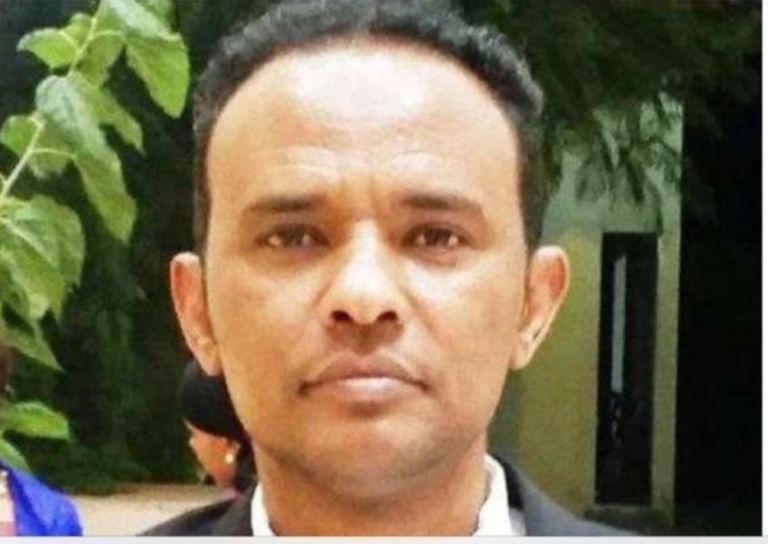
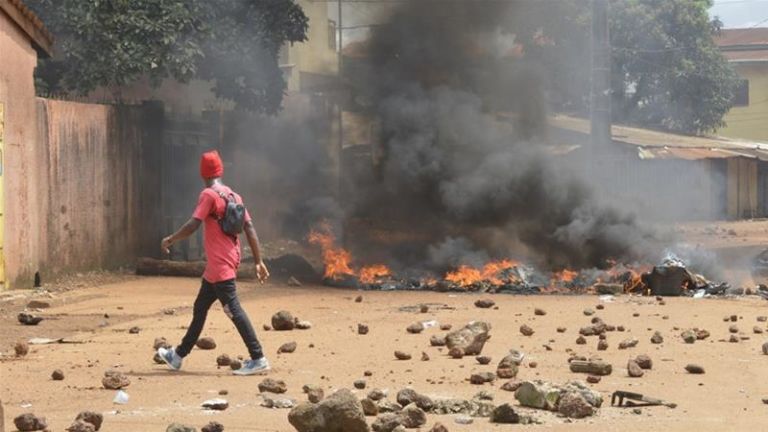

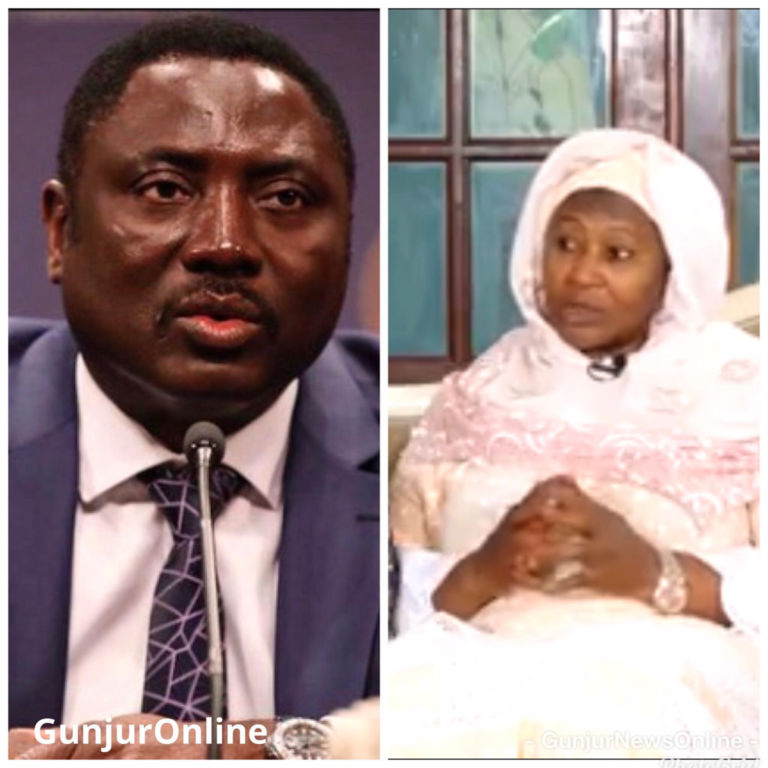
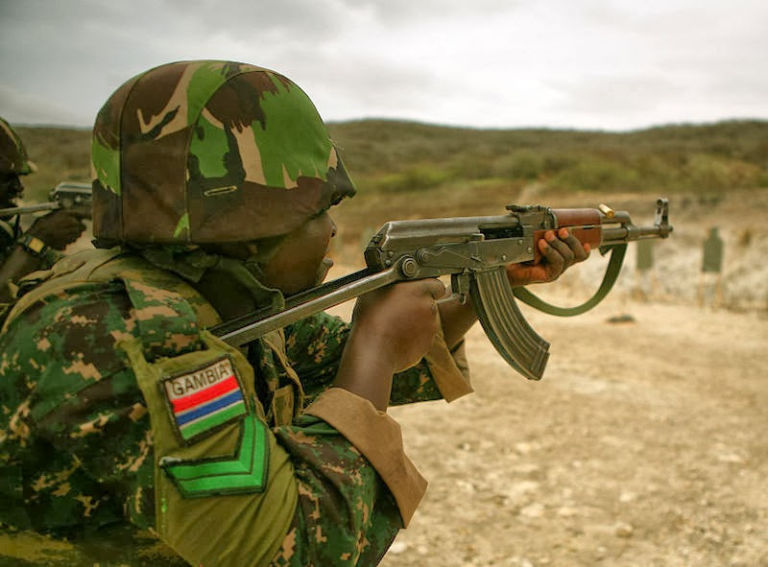
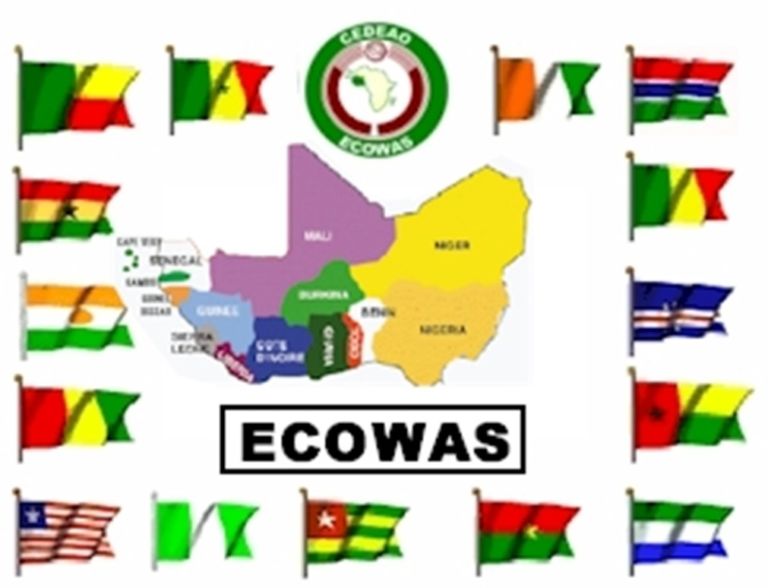
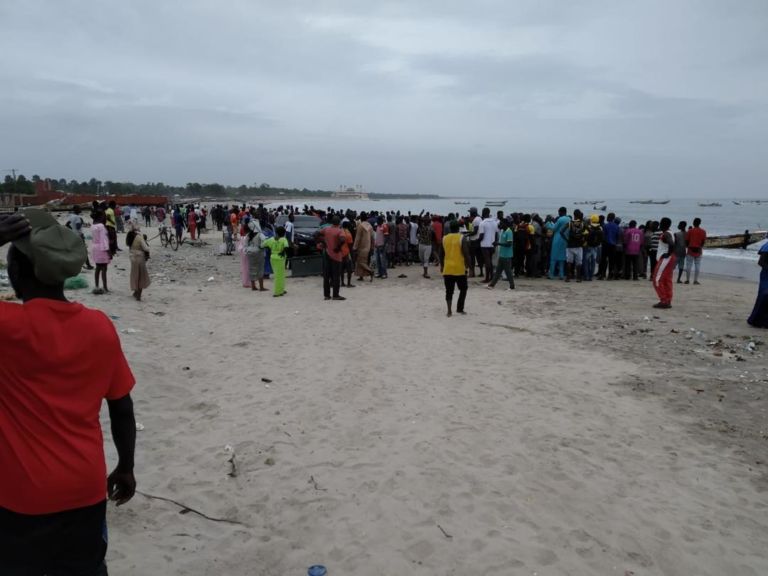
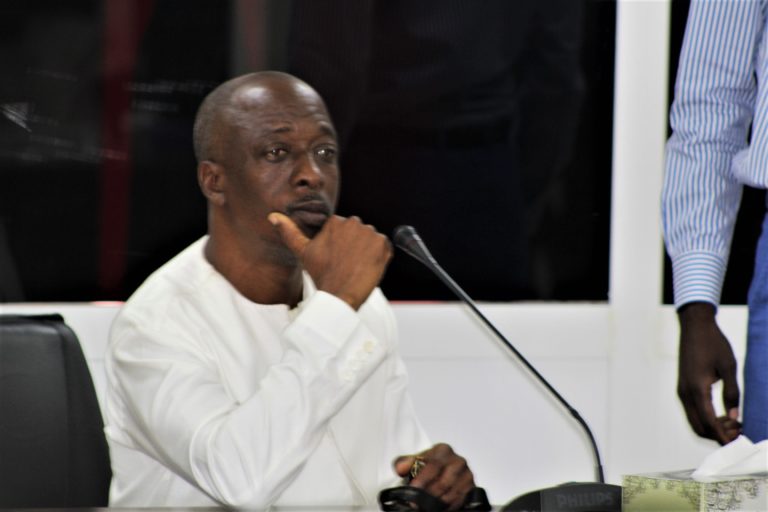
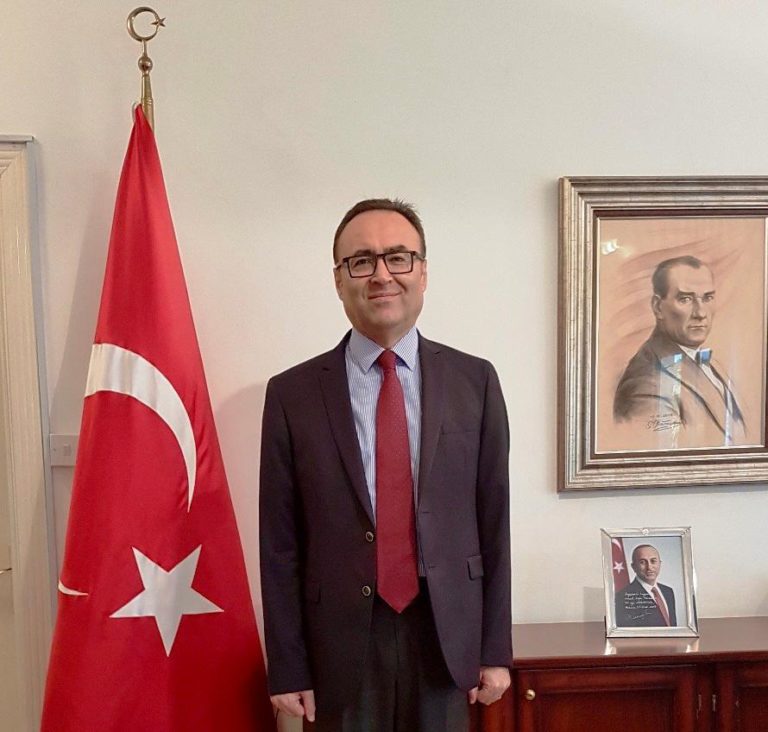
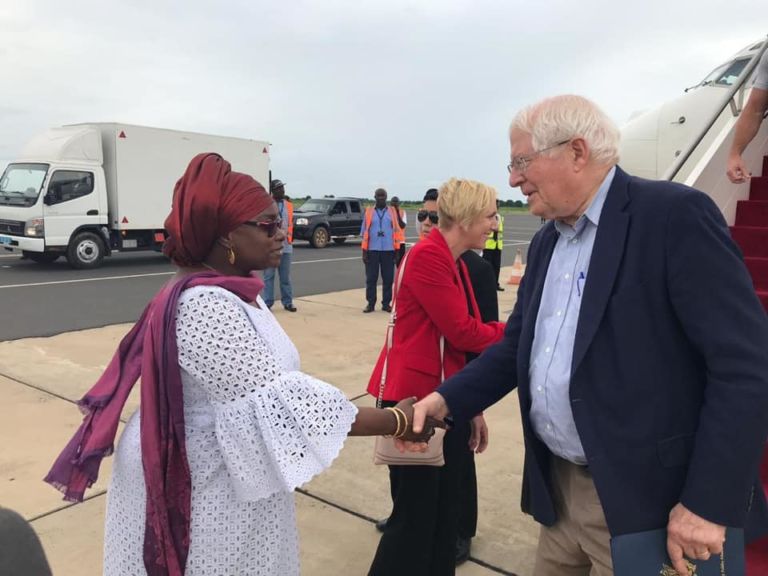
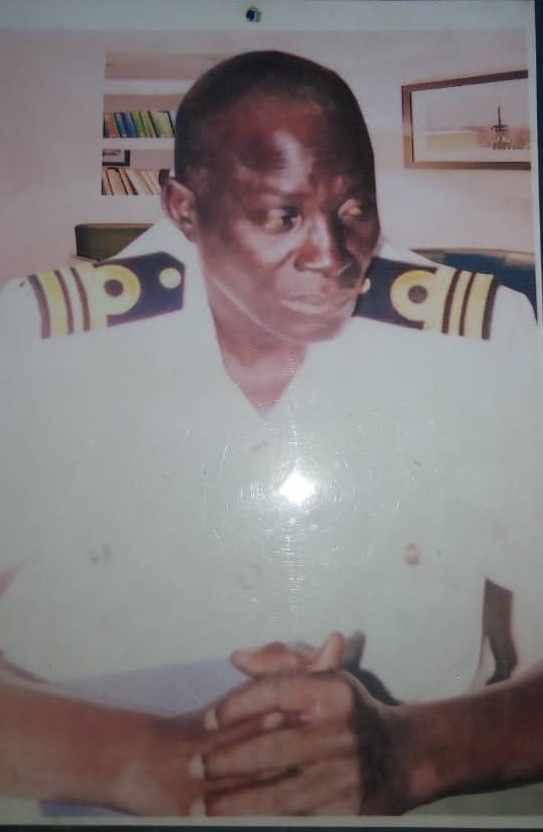

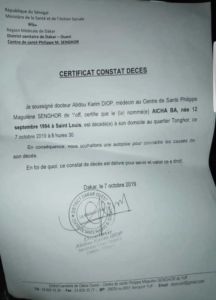
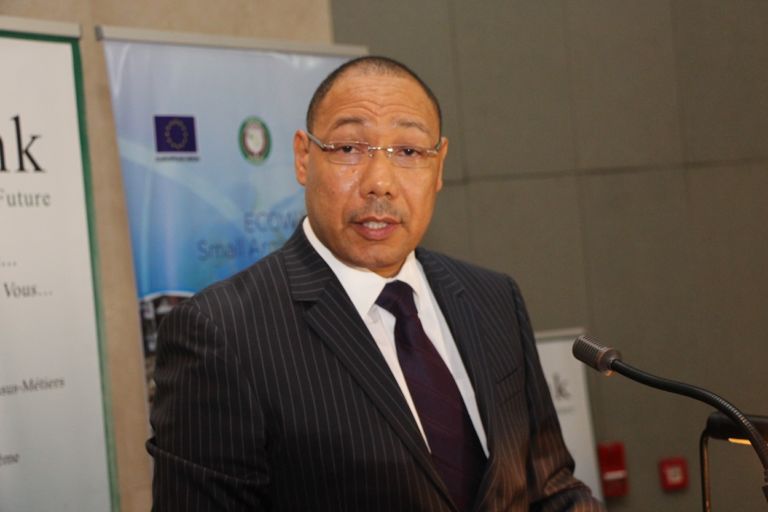
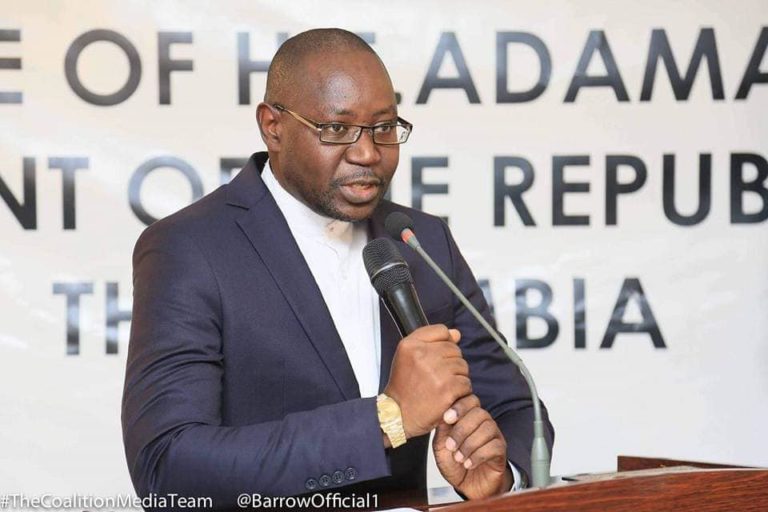
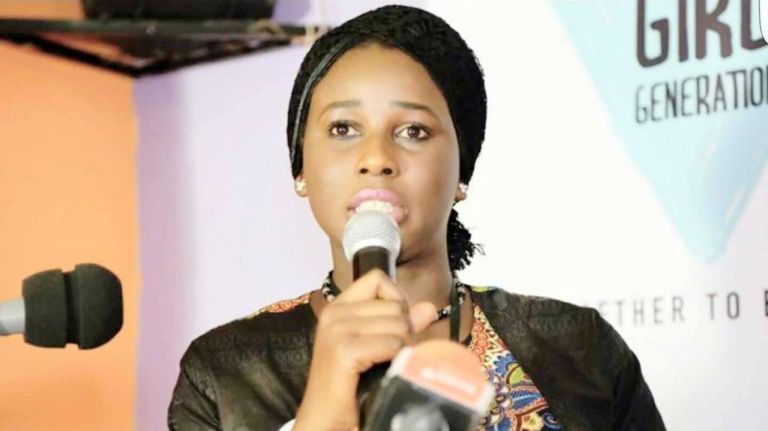

Why Turkey took the fight to Syria
It is dismaying that Turkey’s military operation in northeastern Syria is being spun in the American news media as an attack on Kurds, as weakening the fight against the remnants of Daesh (or the so-called Islamic State) and hurting America’s credibility with its allies. I am compelled to set the record straight because the 67-year-old NATO alliance that Turkey has with the United States is not temporary, tactical nor transactional.
Turkey started the operation to ensure its national security by removing the danger posed by terrorists along its border regions. This operation will liberate Syrians living there from the tyranny of terrorist organizations and eliminate the threat to Syria’s territorial integrity and political unity. These two developments would facilitate the safe and voluntary return of displaced Syrians.
Turkey has never accepted a corridor run by a terrorist group on its border. We have repeatedly proposed establishing a safe zone, including at the United Nations General Assembly. We have called on the United States to stop providing material support to terrorists.
But the American security bureaucracy couldn’t bring itself to disengage from the group, known for short as the P.Y.D./Y.P.G. This is even though American officials, including a secretary of defense, have admitted that the P.Y.D./Y.P.G., which forms the core of Syrian Democratic Forces, is inseparable from the Kurdistan Workers’ Party, or the P.K.K., in Turkey, which is recognized as a terrorist organization by the United States, the European Union and NATO.
Our American interlocutors seemed to agree that those forces needed to be removed from along our borders and we had even agreed on a timeline. Most recently, military-to-military talks in August ended with a mutual commitment to establish a safe zone from which the P.Y.D./Y.P.G. was supposed to be removed. But the United States did not see this through and gave us the strong impression that it was playing for time as the terrorist group entrenched itself even deeper in Syria.
The P.Y.D./Y.P.G. may present itself to the world as the group that fought Daesh, but it also smuggles explosives to the P.K.K. by digging tunnels into Turkish soil. We have found its members ushering Daesh prisoners toward Turkey. And in November 2017, the BBC reported on a secret deal under which the Syrian Democratic Forces arranged transport and allowed hundreds of Daesh terrorists to escape during the coalition operation to liberate the city of Raqqa.
We had to act. Several voices expressed concerns about the safety of the Kurdish population in Syria. I want to repeat and emphasize that Turkey’s fight is not against the Kurds. Our fight is against the terrorists. Any description of the situation as “Turks against Kurds” is malicious and false. Kurds are not our enemies.
Our target is the complex of terror run together by the Kurdistan Workers’ Party and the P.Y.D./Y.P.G., which have recruited child soldiers, intimidated dissidents, altered the demography and forced conscription in areas under their control.
The Kurds, Arabs, Christians and others who have been suffering under the P.Y.D./Y.P.G. yoke will be better off when freed. The World Council of Aramaean Christians have been asserting this point insistently.
Before proceeding with this operation, we have taken all steps to minimize risk to civilians and prevent a humanitarian crisis. Over the past several years, Turkey has provided shelter to large numbers of refugees from northeastern Syria, including Arabs, Kurds and Turkmens.
Most of them, including over 300,000 Kurds, were driven from their homes by the terrorists. We have extended to them safety, shelter and livelihood in Turkey. We have shared our bread and the benefits of our public services. Turkey is the biggest humanitarian spender in the world and host to most refugees worldwide.
Turkey has established a reliable pattern in the last three years. Turkey’s operations in northwestern Syria — in 2016-7 in and around Jarabulus and 2018 in Afrin — cleared a vast area of the terrorist presence. In the aftermath of those operations the communities that suffered under the terrorists started living in peace and benefiting from orderly governance. Some 365,000 refugees returned to their home in northwestern Syria.
We have instituted public services, including schools for over 230,000 students. Six hospitals with 55 ambulances employ over 2,000 Syrian and Turkish personnel in liberated areas in northwestern Syria. Scores of recreational and sports facilities were built, including a soccer stadium. Businesses were rehabilitated and a border gate was opened to facilitate trade. Agriculture and animal husbandry started receiving material support.
Compare Turkey’s previous operations to the destruction of Raqqa by the coalition and you will see how carefully we manage counterterrorism operations. The lessons learned in those operations will help us make it even better this time around.
The P.K.K. and the P.Y.D./Y.P.G. have been blackmailing the global community by claiming that the fight against Daesh would falter without them. But the fight against those brutal terrorists will not falter, especially if our allies stay the course and cooperate with Turkey. We are the only nation that put boots on the ground against Daesh.
The fight against Daesh and other terrorist organizations will have to continue with everyone’s contributions and cooperation. Several European countries have been reluctant to allow the return of their citizens who joined the group. However, wishing away the problem cannot be the policy. They must shoulder their share of the burden.
We in Turkey are convinced that we are paving the way for the Syrian refugees to return home and ensuring that Daesh and other terrorist groups will not re-emerge.
I am aware that safe and voluntary return home of the Syrian refugees needs to be carefully planned and managed. This has to proceed in accordance with international law and in cooperation with the relevant United Nations agencies. Syria is home to several ethnicities and viable and representative local councils need to be established until a political solution is found to the Syrian conflict.
After our last counterterrorism operation, in areas where the Kurds were in majority, Turkey facilitated the creation of local governing councils with a Kurdish majority to reflect the population.
The Syrians want to go home now. They have suffered more than enough. We are taking the initiative to help create the peaceful conditions that are necessary for the homecoming of millions of refugees. Contrary to the prevailing misapprehensions, our operation will help address the humanitarian dimension of the problem, contribute to the preservation of the unity of the country and add to the political process.
The writer, Mevlut Cavusoglu, is the foreign minister of Turkey.